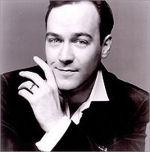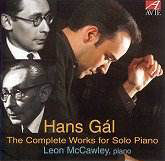Producers Comments
This recording was made using Earthworks QTC1’s as the main pair. The live acoustic of the hall is present, but not enough to allow the music to breath; a bigger, more expansive space is needed. This is supplied by Classical imulse IR 1543, one of my favourites: light in the bass, lively in the treble, and has a pronounced ‘rebound’ in the tail.
Here is the ‘dry’ original.
And here is the mix incorporating IR 1543:
The copyright in these tracks is owned by Eva Fox-Gál.
Here is the ‘dry’ original.
And here is the mix incorporating IR 1543:
The copyright in these tracks is owned by Eva Fox-Gál.
About Hans Gal
Gal [Gal], Hans (b Brunn, nr Vienna, 5 Aug 1890; d Edinburgh, 3 Oct 1987).
Austrian composer and musicologist. He studied composition with Mandyczewski and music history with Guido Adler at Vienna University, completing the doctorate in 1913 on the style of the young Beethoven. Two years later he won the newly created Austrian State Prize for composition. From 1919 until 1929 he was lecturer in music theory at the university, and the period between the end of World War I and 1933 saw his rapid rise to success as a composer, above all with his second opera Die heilige Ente, performed in some 20 theatres. After winning the Columbia Schubert centenary prize for his Sinfonietta in 1928, he was appointed director of the Mainz Conservatory (1929--33). On Hitler's accession to power in 1933 he was instantly dismissed and the performance and publication of his works were banned because he was Jewish. He returned to Austria, but was driven out by the Anschluss in 1938 and fled to England. Tovey invited him to Scotland, where he settled in 1939 and was appointed lecturer at Edinburgh University in 1945. From that time he played an active part in the musical life of the city, not only as lecturer, but also as conductor, pianist, musical personality and founder-member of the Edinburgh International Festival. He remained active as a composer but never re-established his pre-war career and relatively little of his output is known.
Of his 110 published works, more than half were composed in Scotland. His values were deeply rooted in the tonal tradition of the Austro-German musical style. Though an inheritor of the legacy of Brahms, he had by the time of his twenties found his own distinctive musical language to which, regardless of changing musical fashions, he remained true. It unites many elements: the clarity, playful humour and formal mastery of early Classicism; the chromatic harmony and extended tonality of early 20th-century, pre-serial music; a Schubertian love of melody; the lyricism and emotional restraint of Brahms and the contrapuntal textures that remained fundamental to his style. His deep insight into the life and work of great musicians is shown in his books -- on Brahms, Schubert, Wagner and Verdi.
More info on Hans Gal
Austrian composer and musicologist. He studied composition with Mandyczewski and music history with Guido Adler at Vienna University, completing the doctorate in 1913 on the style of the young Beethoven. Two years later he won the newly created Austrian State Prize for composition. From 1919 until 1929 he was lecturer in music theory at the university, and the period between the end of World War I and 1933 saw his rapid rise to success as a composer, above all with his second opera Die heilige Ente, performed in some 20 theatres. After winning the Columbia Schubert centenary prize for his Sinfonietta in 1928, he was appointed director of the Mainz Conservatory (1929--33). On Hitler's accession to power in 1933 he was instantly dismissed and the performance and publication of his works were banned because he was Jewish. He returned to Austria, but was driven out by the Anschluss in 1938 and fled to England. Tovey invited him to Scotland, where he settled in 1939 and was appointed lecturer at Edinburgh University in 1945. From that time he played an active part in the musical life of the city, not only as lecturer, but also as conductor, pianist, musical personality and founder-member of the Edinburgh International Festival. He remained active as a composer but never re-established his pre-war career and relatively little of his output is known.
Of his 110 published works, more than half were composed in Scotland. His values were deeply rooted in the tonal tradition of the Austro-German musical style. Though an inheritor of the legacy of Brahms, he had by the time of his twenties found his own distinctive musical language to which, regardless of changing musical fashions, he remained true. It unites many elements: the clarity, playful humour and formal mastery of early Classicism; the chromatic harmony and extended tonality of early 20th-century, pre-serial music; a Schubertian love of melody; the lyricism and emotional restraint of Brahms and the contrapuntal textures that remained fundamental to his style. His deep insight into the life and work of great musicians is shown in his books -- on Brahms, Schubert, Wagner and Verdi.
More info on Hans Gal
About Leon McCawley

A pianist of rare quality’ - Daily Telegraph
Leon McCawley leapt into international prominence in 1993 when he won both First Prize in the Ninth International Beethoven Piano Competition in Vienna and Second Prize in the Leeds International Competition, building on earlier national first prize successes in the Piano Section of the BBC Young Musician of the Year and the London Philharmonic Orchestra’s Pioneer Young Soloist of the Year in 1990. Since then, his CD releases of Barber, Beethoven and most recently, Schumann have established McCawley as a pianist of great integrity, bringing freshness and vitality to both popular and lesser known repertoire.
McCawley’s deeply committed performances and engaging musicality have made him a favourite wherever he performs. In recent seasons he has given highly praised recitals at the Queen Elizabeth Hall, Wigmore Hall and LSO St Lukes in London, at the Philharmonie and Konzerthaus in Berlin, the Prinzregententheater in Munich, the Musikverein in Vienna, Tonhalle in Zurich, Festival Radio France in Montpellier, Rudolfinum in Prague and, Washington DC’s Kennedy Center. As a chamber musician he has enjoyed fruitful collaborations with the Nash Ensemble, The Lindsays, Belcea and Chilingirian Quartets, Emma Johnson, Andrew Marriner and Steven Isserlis.
As a concerto soloist, McCawley is frequently heard with many of the leading British orchestras including the London Philharmonic, Philharmonia and Royal Philharmonic Orchestras, the City of Birmingham Symphony, Bournemouth Symphony, Hallé and Royal Scottish National Orchestra. He is regularly broadcast on BBC Radio 3, with the BBC Orchestras as well as in recital and, has performed at the BBC Proms several times. Further afield, McCawley has played concertos with, amongst others, Adelaide Symphony, Dallas Symphony, Malaysian Philharmonic, Minnesota Orchestra, Vienna Symphony and Vienna Chamber Orchestra and worked with conductors including Mark Elder,Paavo Järvi,Andrew Litton, Kurt Masur, Sakari Oramo, Simon Rattle and Yan Pascal Tortelier.
Born in 1973, McCawley studied at Chetham’s School of Music, Manchester with Heather Slade-Lipkin before moving to the US where he continued his studies at the Curtis Institute of Music, Philadelphia with Eleanor Sokoloff. He also acknowledges Nina Milkina for her inspiration and guidance.
Since 2004 he has performed with, among others, the City of Birmingham Symphony/Sakari Oramo, the Netherlands Philharmonic/Joseph Swensen, and the Royal Philharmonic Orchestra/Daniele Gatti. Forthcoming London performances include a recital at SBC’s International Piano Series in May 2005, and a concerto appearance with the Academy of St Martin-in-the-Fields as part of the Barbican’s Mostly Mozart Festival in July 2005.
McCawley has made three recordings to date: Barber’s Music for Solo Piano for EMI/Virgin; Beethoven: Piano Works on Sanctuary Classics; and, most recently a double disc of Schumann’s piano music for Avie Records. The Schumann was selected as "Editor's Choice" in the March 2004 edition of Gramophone. Due for release later this year is a recording of all Hans Gal’s music for piano, for Avie Records.
Leon McCawley leapt into international prominence in 1993 when he won both First Prize in the Ninth International Beethoven Piano Competition in Vienna and Second Prize in the Leeds International Competition, building on earlier national first prize successes in the Piano Section of the BBC Young Musician of the Year and the London Philharmonic Orchestra’s Pioneer Young Soloist of the Year in 1990. Since then, his CD releases of Barber, Beethoven and most recently, Schumann have established McCawley as a pianist of great integrity, bringing freshness and vitality to both popular and lesser known repertoire.
McCawley’s deeply committed performances and engaging musicality have made him a favourite wherever he performs. In recent seasons he has given highly praised recitals at the Queen Elizabeth Hall, Wigmore Hall and LSO St Lukes in London, at the Philharmonie and Konzerthaus in Berlin, the Prinzregententheater in Munich, the Musikverein in Vienna, Tonhalle in Zurich, Festival Radio France in Montpellier, Rudolfinum in Prague and, Washington DC’s Kennedy Center. As a chamber musician he has enjoyed fruitful collaborations with the Nash Ensemble, The Lindsays, Belcea and Chilingirian Quartets, Emma Johnson, Andrew Marriner and Steven Isserlis.
As a concerto soloist, McCawley is frequently heard with many of the leading British orchestras including the London Philharmonic, Philharmonia and Royal Philharmonic Orchestras, the City of Birmingham Symphony, Bournemouth Symphony, Hallé and Royal Scottish National Orchestra. He is regularly broadcast on BBC Radio 3, with the BBC Orchestras as well as in recital and, has performed at the BBC Proms several times. Further afield, McCawley has played concertos with, amongst others, Adelaide Symphony, Dallas Symphony, Malaysian Philharmonic, Minnesota Orchestra, Vienna Symphony and Vienna Chamber Orchestra and worked with conductors including Mark Elder,Paavo Järvi,Andrew Litton, Kurt Masur, Sakari Oramo, Simon Rattle and Yan Pascal Tortelier.
Born in 1973, McCawley studied at Chetham’s School of Music, Manchester with Heather Slade-Lipkin before moving to the US where he continued his studies at the Curtis Institute of Music, Philadelphia with Eleanor Sokoloff. He also acknowledges Nina Milkina for her inspiration and guidance.
Since 2004 he has performed with, among others, the City of Birmingham Symphony/Sakari Oramo, the Netherlands Philharmonic/Joseph Swensen, and the Royal Philharmonic Orchestra/Daniele Gatti. Forthcoming London performances include a recital at SBC’s International Piano Series in May 2005, and a concerto appearance with the Academy of St Martin-in-the-Fields as part of the Barbican’s Mostly Mozart Festival in July 2005.
McCawley has made three recordings to date: Barber’s Music for Solo Piano for EMI/Virgin; Beethoven: Piano Works on Sanctuary Classics; and, most recently a double disc of Schumann’s piano music for Avie Records. The Schumann was selected as "Editor's Choice" in the March 2004 edition of Gramophone. Due for release later this year is a recording of all Hans Gal’s music for piano, for Avie Records.


 RSS Feed
RSS Feed